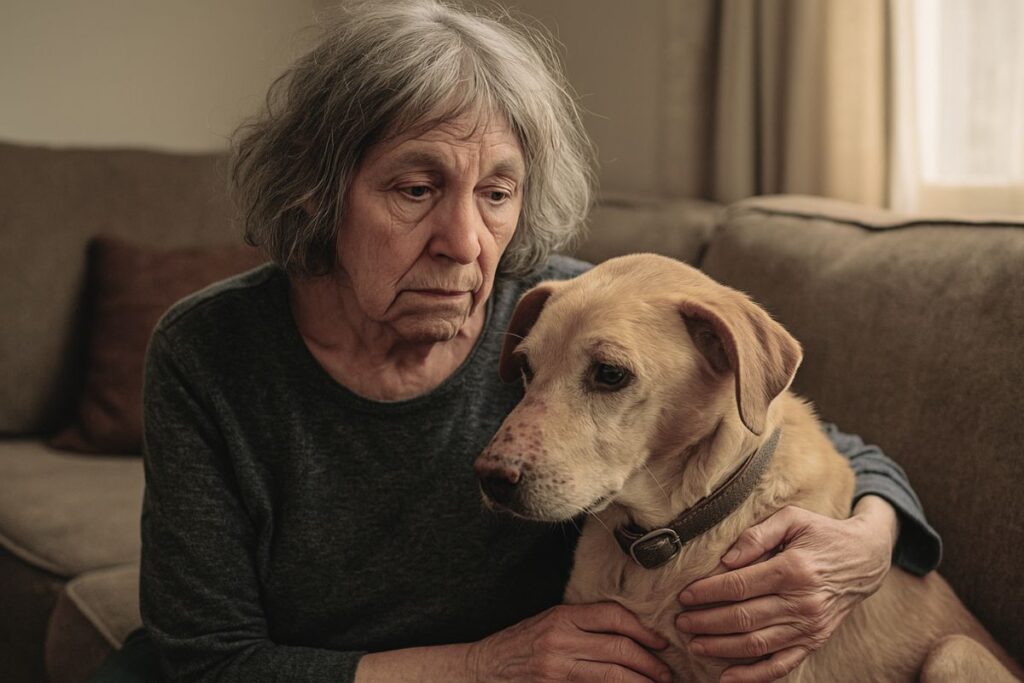Part 7 – The Ones Left Behind
The shelter called on a Thursday.
“We have a little guy who probably won’t make it through the week,” the woman said. “Parvo. Someone left him in a box outside. We’re keeping him comfortable. Would you like to come sit with him?”
Eleanor didn’t hesitate.
“Yes,” she said. “I’ll come.”
She left Grace curled on the couch, a soft blanket over her hind legs and a biscuit tucked beside her paw. The look Grace gave her wasn’t one of jealousy or concern — just understanding.
She knew where Eleanor was going.
And why.
The shelter smelled of bleach and sadness, like all places where too much love is met too late.
They led her to a corner kennel, where a small white puppy lay trembling on a towel. His ribs pressed through his skin like broken reeds. His eyes were half-closed.
“He’s not in pain,” the attendant said. “We’re just… waiting.”
Eleanor sat beside him.
Didn’t speak.
Didn’t cry.
She simply placed her hand near his paw.
At first, he didn’t move.
Then, after a moment, his paw shifted — just enough to touch her fingers.
Eleanor stayed for two hours.
She told him about the field behind her house. About Grace. About the smell of biscuits baking and the song Harold used to hum off-key.
She stayed until the little body stilled.
Then she sat a while longer.
That night, Grace didn’t leave her side.
She pressed her head into Eleanor’s chest and stayed there, silent and warm.
“You knew,” Eleanor whispered. “You always know.”
Spring broke fully in the weeks that followed.
The dogwood trees behind the house bloomed in ivory and blush. The porch smelled of lilac. The birdbath filled with rain and song.
Eleanor visited Ruth twice a week now.
And George had started leaving cookies on her porch — poorly wrapped and overly crisp, but made with real effort. That mattered more than the taste.
One afternoon, the community center called again.
“We’re setting up a grief support group,” the coordinator said. “Small. Gentle. Just people who need space.”
Eleanor felt a pulse in her chest.
“Do you need a facilitator?”
“No,” the woman said. “We need someone who knows how to sit quietly. Someone who listens.”
Eleanor looked at Grace.
“I can do that,” she said.
On the first day of the group, Eleanor didn’t speak.
She just poured coffee. Sat by the window. Let the silence unfold.
One woman cried over a son she hadn’t spoken to in twelve years.
Another brought a faded collar from her dog who passed the year before.
Eleanor said nothing.
But when it was time to go, she stood and told them, simply:
“Sometimes you don’t need to be fixed. You just need to be seen.”
That night, she dreamed again.
But it wasn’t the hospital.
Or Harold.
It was her younger self, standing in a field of wildflowers with a stethoscope in one hand and Grace’s leash in the other.
She wasn’t smiling.
She was steady.
Rooted.
Alive.
The next morning, she found Grace already by the door — leash ready, tail wagging.
Eleanor picked it up, opened the screen, and let the sun pour in.
“Let’s go,” she said.
And they did.
Not far.
Just enough.


